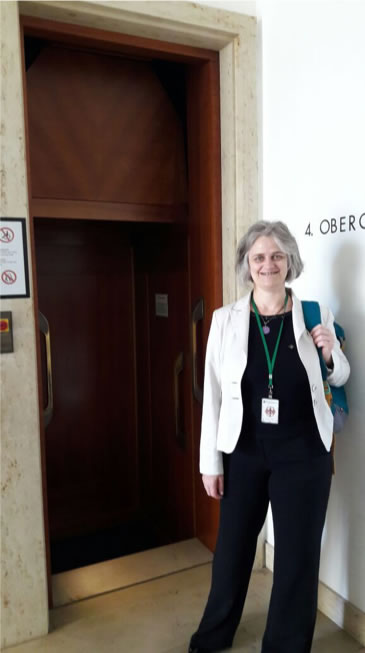

Pastora Romi Bencke
Romi Márcia Bencke was born with a vocation. As a young girl of German descent in the southern state of Rio Grande do Sul, she knew that religion would eventually play a greater role in her life than attending services at the Evangelical Church of Lutheran Confession of Brazil. This Church, like Romi’s own family, found its way to Brazil through German migration and settled in the south of the country.
As a child, Romi once asked the pastor if women could also be pastors. Upon hearing an affirmative answer, she decided: “So that’s what I am going to be.” At 14, Romi went to study at a church boarding school in Ivoti, Rio Grande do Sul, to pursue the dream that was no longer just her own, but also one of the whole community that supported her. There she studied translation, interpreting and pre-theology in a preparatory course for a university degree in theology. When she completed the course, however, she changed her plans and decided to return home. “I realized that I wasn’t mature enough, I didn’t feel prepared to study theology, so I went home, disappointing my family and also my faith community,” she says.
After a little more than two years working as a high school teacher, her vocation called her again and she finally decided to study theology. At the Higher School of Theology in São Leopoldo, Rio Grande do Sul, Romi not only studied the different religions, but also the social role played by them and by churches.
It was from her contact with liberation theology that she started getting involved with social actions and used her vocation for an even greater purpose: the defense of human rights. The motto “unity in diversity”, repeated whenever possible, is more than just a catchphrase; it is a guide for her work in an environment that, perhaps paradoxically, is often marked by conflict.
At university, in the early 1990s, Romi and her colleagues put the concept of social action into practice and set up a support group for HIV-positive people in the city of São Leopoldo. Information on HIV and AIDS in Brazil at the time was very limited and, because of this, she recalls, “people in the church were mad because there was obviously a lot of prejudice. When they found out that theology students were doing this type of intervention, there were lots of complaints, but we stood our ground.” It was a life-changing experience that also introduced her to other realities, such as sex work and the discussion on sexuality, which at that time was still very incipient.
After she graduated, Romi studied and worked with ecumenism, trying to find ways to unite the different religions for the common good. Unity in diversity. For seven years, she worked on ecumenical issues directly with the community as a Lutheran church pastor in a parish in inland Rio Grande do Sul, until she was appointed the first woman to be Secretary General of the National Council of Christian Churches of Brazil (CONIC).
She might not have known it at the time, but the question she asked her pastor when she was a girl demonstrated that she had another vocation: fighting for women’s rights. Romi did not let being a woman stop her from becoming a pastor or get in the way of her work promoting more tolerance in religion.
Her feminist background prompted her to criticize the patriarchal values present in the power relations in Brazilian society and to advocate for gender discussions in both schools and churches. “Women have dignity and they have rights, and no religious group, whatever it may be, can deny the dignity, autonomy and rights of women,” she says.
CONIC currently works on two fronts: promoting the experience of communion and of ecumenical and interreligious spirituality; and having a public presence in dialogue on values that underpin the perspective of equity.
Romi explains that the first point is essential because there is too much religious fundamentalism nowadays and the ecumenical viewpoint is necessary to disseminate the idea that “religion should not be used to promote hate or to divide”. “Religion can strengthen values that prioritize building a culture of peace, tolerance, less hatred, more mutual acceptance, and so on.”

But the second pillar has been gaining prominence and it was primarily on account of this other front that CONIC started working with migration. With the mass inflow of Haitian refugees to Brazil starting in 2010, the Council decided that it was time to get involved with the issue, given that it is a topic so dear to Christian churches and because of the similarities with the story of Jesus.
In 2015, a pilot project was set up called “Immigrants and Refugees: Challenges of the Ordinary House”, in which it was necessary, once again, to look inward, at religion itself. Instead of offering assistance to the people who were coming to Brazil – since CONIC was not considered to have the necessary know-how – the Council chose to work on the acceptance and accommodation of migrants with religious communities to combat prejudice.
“As a result, we addressed other issues related to the topic of migration and asylum. For example, interculturalism, xenophobia and interfaith dialogue, because each migrant arrives with or without their own religious experience, so we need to work on this diversity,” says Romi. However, the project faced difficulties when it encountered cases of xenophobia within its own community. “Our first experiment lasted one year and this experience helped confirm our suspicions about how hard it would be to for the topic of migration and asylum to be accepted by churches.” “Why so difficult?” she asked. She has the answer: “because churches are very self-centered, so when they have to open up and work on a project outside the church, unlike what they are used to doing, they encounter resistance.”
Opening churches to diversity is Romi’s mission. There are numerous partners to be found in this arduous task of fighting for a more diverse yet even more united country, ranging from churches themselves to the Rural Landless Workers Movement (MST) and several other initiatives. “And so we go, leaving a path as we walk,” summarizes Romi.